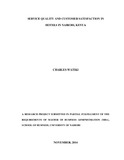| dc.description.abstract | High level of competitiveness in the marketplace in which hospitality industries such as
hotels function has been one of the main reasons why service quality and customer
satisfaction have become of great importance. In the hotel industry, for example, satisfied
customers tend to return and make profit to the hotel. The hotel’s top management’s main
objective therefore, is on how to maximize customer satisfaction. This project had two
objectives: To determine factors influencing customer satisfaction and to examine the
relationship between service quality and customer satisfaction among hotels in Nairobi,
Kenya.
Performance Only Model (SERVPERF) which was developed by Cronin and Taylor
(1992) was used to develop a questionnaire which was later distributed to respondents
from across hotels in Nairobi. Descriptive statistics and Regression analysis were used to
establish the factors influencing customer satisfaction and bringing out the relationship
between service quality and customer satisfaction. All the five service quality variables
yielded positive relation with customer satisfaction. This means that service quality is
strongly linked with customer satisfaction and the higher the service quality, the higher
the customer satisfaction. The results further reveal that reliability dimension contributes
most towards customer satisfaction followed by Empathy, Tangibles and Responsiveness.
Assurance was seen to contribute the least. However all the dimensions were highly rated
and therefore the hotels cannot afford to ignore any of the variable.
From the analysis, it was also established that service quality has a statistically significant
effect on customer satisfaction with a coefficient of determination (R2) of 74.2%. This
implies that service quality contributes 74.2% of customer satisfaction while the other
factors contribute 25.8%. The researcher recommended that future studies could look into
the nature of these other factors that contribute 25.8% of customer satisfaction.
This study contributes to the existing studies examining service quality and customer
satisfaction in the hotel industries. The results from the study could be helpful to the
management of hotels in their policy formulation in the context of improving customer
satisfaction and service loyalty. The researcher recommended that since this study
focused only on hotels within Nairobi, future studies could look into more areas such as
Mombasa and Naivasha which are key tourist sites. | en_US |

